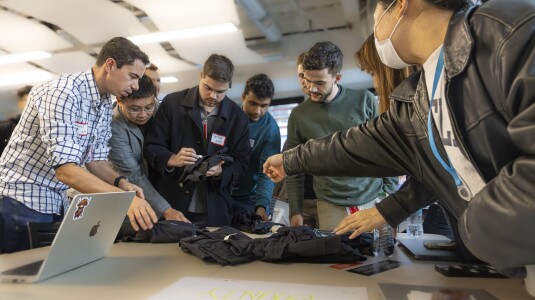In February, in furtherance of an ongoing effort to create enduring pipelines of diverse science talent and differentiated research, Amazon announced a collaboration with Howard University. Today Amazon is announcing an expansion of that collaboration, housed in the College of Engineering and Architecture, to include Amazon Robotics.
The expansion is aimed at addressing a growing need within the robotics space, not just for skilled STEM workers, but particularly for skilled workers with diverse perspectives.
“We need the best and the brightest minds out there thinking about how to build better robots,” said Tye Brady, Amazon Robotics' chief technology officer. “We want different people with different backgrounds, thinking about really hard problems.”
Together with Amazon, we recognize the critical importance of diversity in robotics and are excited that our students are working with an industry partner at the forefront of this important field.
The expanded collaboration will include the construction of the Howard RoboLab, where students — led by Howard professors — will be given access to robotic equipment to enable prototype development and feasibility testing. Students will also have the opportunity to analyze fundamental and data-centric methods relevant to robotics, including modeling, planning, localization, control, and experimentation on real robot platforms.
“Our diverse and exceptionally talented students and faculty are prepared to take full advantage of the unique opportunities provided by our collaboration with Amazon through the Howard Robolab,” said John M. M. Anderson, dean of the Howard University College of Engineering and Architecture. “Howard students and faculty will benefit from the immersive learning experiences and research opportunities afforded by the collaboration, and in turn, Amazon will benefit from expanding the pool of talent in robotics. Together with Amazon, we recognize the critical importance of diversity in robotics and are excited that our students are working with an industry partner at the forefront of this important field.”
The collaboration, which will be housed in the College of Engineering and Architecture, will include funding for a graduate student who will serve as a lab assistant, annual fellowships, 10-week internship opportunities for rising graduate students, and a senior capstone course.
The RoboLab will be located in the Lewis K. Downing Building, named after Howard’s first dean of engineering. The building's name honors Downing's “groundbreaking work in creating pathways for engineering and architecture students of color.”
In addition, Howard will expand its current course offerings to include robotics-specific classes with the support of industry experts at Amazon Robotics and Amazon Web Services. The courses will showcase student solutions, developed in conjunction with Amazon researchers, that address significant challenges in robotics.
“When we first engaged with Howard, we were really impressed with their computer science program and the passion the professors had for engineering,” Brady noted. “That really resonated with us and gave us confidence that we can conduct groundbreaking research with Howard.”
In addition to the university-focused aspects, the collaboration between Amazon and Howard will also seek to engage local high-school students to provide them with training and access to educational resources. Those efforts will include a drone camp, where high-school students will be able to build, fly, test, and keep their own drones as a means to introduce them to the fundamentals of robotics, physics, and applied science.
"We are thrilled to be expanding our collaboration with Amazon to include robotics-specific classes and hands-on experience in robotics. This will provide our students with invaluable experience, preparing them to be leaders in the growing field of robotics,” said Harry Keeling, associate professor of computer science. “We are grateful to Amazon for their commitment to diversity and their dedication to creating opportunities for underrepresented communities in STEM."





